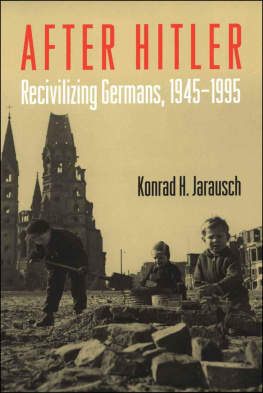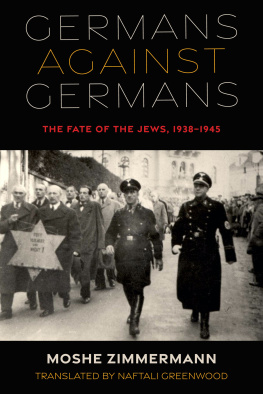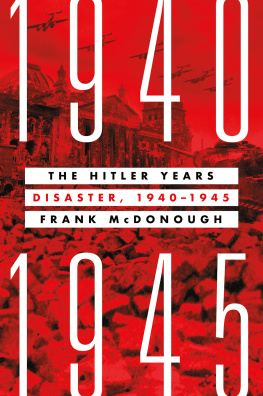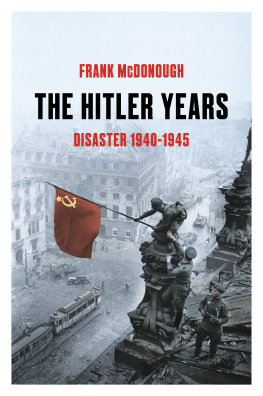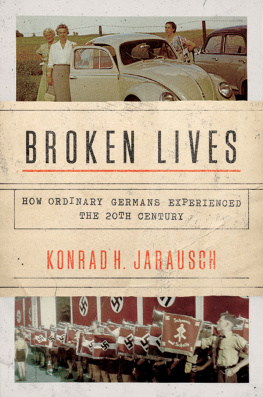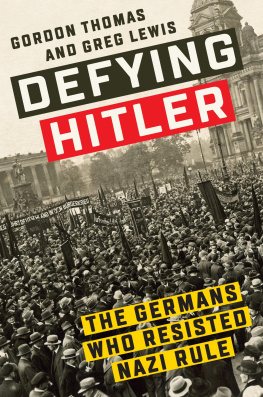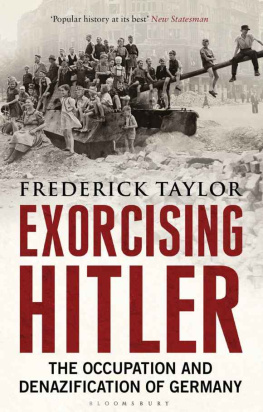AFTER HITLER
AFTER HITLER
Recivilizing Germans, 19451995
Konrad H. Jarausch
Translated by
Brandon Hunziker


Oxford University Press, Inc., publishes works that further
Oxford Universitys objective of excellence
in research, scholarship, and education.
Oxford New York
Auckland Cape Town Dar es Salaam Hong Kong Karachi
Kuala Lumpur Madrid Melbourne Mexico City Nairobi
New Delhi Shanghai Taipei Toronto
With offices in
Argentina Austria Brazil Chile Czech Republic France Greece
Guatemala Hungary Italy Japan Poland Portugal Singapore
South Korea Switzerland Thailand Turkey Ukraine Vietnam
Published in Germany as Die Umkehr. Deutsche Wandlungen 19941995.
Copyright 2006 by Oxford University Press
Published by Oxford University Press, Inc.
198 Madison Avenue, New York, New York 10016
www.oup.com
Oxford is a registered trademark of Oxford University Press
All rights reserved. No part of this publication may be reproduced, stored in a retrieval system, or transmitted, in any form or by any means, electronic, mechanical, photocopying, recording, or otherwise, without the prior permission of Oxford University Press.
Library of Congress Cataloging-in-Publication Data
Jarausch, Konrad Hugo.
[Umkehr. English]
After Hitler: recivilizing Germans, 19451995 / Konrad H. Jarausch;
translated by Brandon Hunziker.
p. cm.
Includes bibliographical references and index.
ISBN 13 978-0-19-512779-9
ISBN 0-19-512779-X
1. GermanyHistory19451990. 2. GermanySocial
conditions20th century. 3. Political cultureGermany.
4. GermanyEconomic conditions19451990. I. Title.
DD257.4.J3413 2006
943.087dc22 2005055486
9 8 7 6 5 4 3 2 1
Printed in the United States of America
on acid-free paper
PREFACE
Americans harbor somewhat ambivalent feelings about Germany. On the one hand, many observers remain skeptical: This is true especially of the individuals whose families suffered during World War II, who hold deep-seated resentments against the country. Seeing Nazi crimes as the embodiment of ultimate evil, many intellectuals remain deeply suspicious of the claim that the country of the perpetrators may have reformed. Even prominent journalists such as Jane Kramer of the New Yorker and Mark Fischer of the Washington Post are more interested in the dark past than in the changes that followed. On the other hand, other commentators are more charitable: Most soldiers and businessmen who have lived in the Federal Republic fondly remember a friendly and hard-working people that seem to be much like their own. For instance, while fighting in the Vietnam jungle, many GIs dreamed about being stationed back home in Germany. More recently, President George W. Bush somewhat misleadingly cited the transformation of the Germans after World War II as justification for his democratic crusade abroad.
These contradictory evaluations rest on a disconnect between the prevalence of negative Nazi memories and a lack of appreciation for the positive transformation during the last half century. For instance, in his indictment of eliminatory anti-Semitism, Daniel J. Goldhagen paints a vivid picture of the complicity of ordinary Germans but suggests without further explanation that somehow the country miraculously transformed after 1945. Compared to the academic attention devoted to exploring Hitlers seizure of power and the effort to educate the public about the crimes of the Holocaust, the difficult process by which the Germans distanced themselves from nationalism and rejoined the international community thereafter remains underexplored. Almost any volume with a swastika on its cover will attract attention, since it promises to satisfy the fascination with ultimate evil. But attempts to explain the subsequent material and moral recovery tend to languish because its success is somehow taken for granted.
Seeking to redress the balance, in this book I intend to tell the neglected story of the struggle to rehabilitate the Germans after Hitler. It is important not only to analyze what went wrong in the past but also to point out how things were put right again after the Nazi catastrophe, since recovering from dictatorship and atoning for massive crimes is an issue facing other nations beyond Germany. Due to the magnitude of the culpability and the extent of the devastation during the war of annihilation, it seemed hardly likely in 1945 that this damage could be undone and the chief culprit actually be reformed. The harsh confrontation of the Cold War that divided not just Germany but Europe and other parts of the world did not make this laborious process any easier. Who should receive the credit for the successful transformationthe victorious powers or the defeated themselves? What measures worked best to reorient an entire political culturecompulsion or incentives? Such questions indicate the need to not just address failure but to explain success.
For analyzing the postwar transformation, the scholarly literature is only somewhat helpful because most works frame the issue in institutional rather than cultural terms. The English-language surveys by Anthony J. Nicholls, Henry Turner, as well as that by Dennis Barck and David Gress, provide much basic information on general developments, but they neglect East Germany and remain state-centered. Political science studies such as the leading textbook by David Conradt offer useful material on the formal government structure, yet they do not pay enough attention to the underlying shift of attitudes. Major German reflections by Axel Schildt, Anselm Doering-Manteuffel, and Heinrich August Winkler point to the important process of Westernization but fail to confront the problematic nature of that concept. Only Mary Fulbrook and Peter Graf Kielmansegg come close to addressing the question of cultural transformation, but even they often lapse into expository narratives.
My own views differ from these authors because I write from a Euro-American perspective that does not quite fit the popular interpretations on either side of the Atlantic. Born during the war, I grew up and was educated in Germany, but I came to the United States over four decades ago to receive my academic training. The division of my institutional responsibilities between the Lurcy Chair for European Civilization at the University of North Carolina at Chapel Hill and the directorship of the Zentrum fr Zeithistorische Forschung in Potsdam has deepened this sense of cultural hybridity. Even though I am at home in both the German and American discourses, I sometimes feel like an outsider who is tempted to challenge the basic assumptions of each. Thus, the following reflections emerge from a transatlantic double perspective, which seeks to describe the extent of and explain the reasons for the transformation of my country of birth to skeptics in my adopted home.
In this book I propose the thesis that a collective learning process took place after Hitler, bringing the Germans back from perpetrating unspeakable crimes to a sincere commitment to human rights. Unlike the intellectual preoccupation with German efforts to deal with the Nazi past (explored by Charles Maier and Jeffrey Herf), this investigation focuses primarily on the practical lessons that a disoriented people drew from their past misdeeds. My analysis pays particular attention to the relationship between the outside interventions of the United States and the Soviet Union and the inside insights of the minority of anti-Fascist Germans who were ready to make a new start. In an attempt to integrate both postwar histories, I contrast the Western consequences drawn from the catastrophe with the Eastern efforts to learn from disaster. Since the transformation was a drawn-out process, I concentrate here on three different stages of its development, starting with the postwar period, then focusing on the 1960s, and concluding with the 1990s.
Next page
